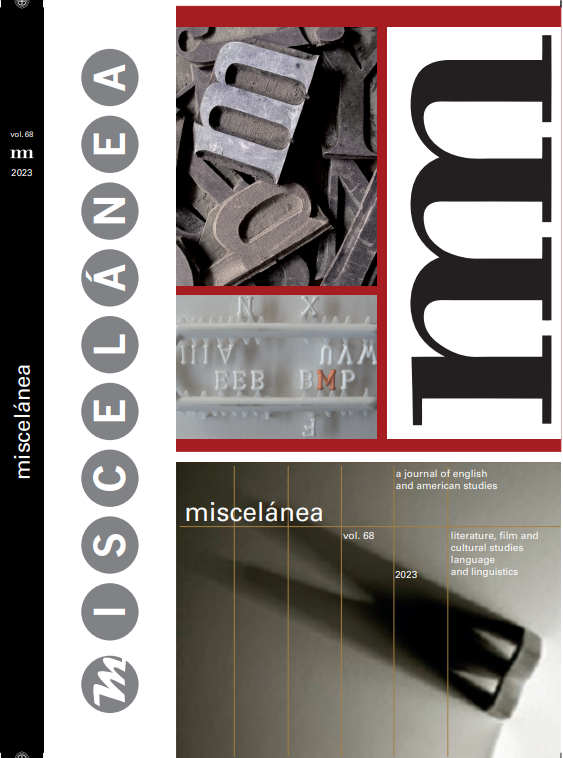Ra´íces Diaspóricas/Rutas Circulares: Búsqueda del Hogar en The Cypress Tree; A Love Letter to Iran (2011) de Kamin Mohammadi
DOI:
https://doi.org/10.26754/ojs_misc/mj.20237383Palabras clave:
The Cypress Tree, identidad, nacionalismo, diáspora, hogarResumen
Este artículo explora la posición de Kamin Mohammadi con respecto a los discursos de pertenencia nacional a través del escrutinio de su ruta circular desde Inglaterra hasta Irán. Reflejando la interrelación entre la identidad, el hogar y el estadonación moderno, The Cypress Tree: A Love Letter to Iran (2011) relata la historia del viaje de regreso de Mohammadi a Irán en busca de un yo singular. Cuenta la
historia de cómo creció en Irán e Inglaterra y la razón de su desplazamiento de ambos países en 1979 y 1997 respectivamente. En deuda con la visión de la diáspora de Stuart Hall, la lectura del hogar de Gaston Bachelard y la noción de hibridación de Homi Bhabha, este artículo rechaza la sinonimia entre hogar y patria, así como la pertenencia exclusiva intrínseca al nacionalismo. El objetivo de este artículo es entender la decisión final de Mohammadi de establecerse en Inglaterra como un desafío a las fuerzas homogeneizadoras del nacionalismo que
inhibieron su sentido de pertenencia a Gran Bretaña y la atrajeron hacia Irán. Mientras adopta una identidad híbrida al contar su historia circular, que comienza y termina en Londres, su contribución literaria es una forma de desmantelar el vínculo entre la pertenencia y el Estado-nación, así como un desafío a la supuesta homogeneidad de los Estados-nación a la que ella pertenece.
Descargas
Citas
Ashcroft, Richard T. and Mark Bevir. 2019. “British Multiculturalism after Empire”. In Ashcroft, Richard T. and Mark Bevir (eds.) Multiculturalism in the British Commonwealth. California U.P.: 25-45.<https://doi.org/10.1515/9780520971103-003>.
Bac helard, Gaston. 1994. The Poetics of Space. Trans. M. Jolas. Boston: Beacon Press.
Bhabha, Homi K. 1984. “Of Mimicry and Man: The Ambivalence of Colonial Discourse”. October 28: 125-133 <https://doi.org/10.2307/778467>.
Bhabha, Homi K. 2012. The Location of Culture. London: Routledge.
Brah, Avtar. 2005. Cartographies of Diaspora: Contesting Identities. London: Routledge. Cronin, Stephanie. 2009. “Re-interpreting Modern Iran: Tribe and State in the Twentieth Century”. Iranian Studies 42 (3): 357-388.<https://doi.org/10.1080/00210860902907297>.
Diaspora”. Melus 33 (2): 55-71.<https://doi.org/10.1093/melus/33.2.55>.
Ehsani , Kaveh. 2003. “Social Engineering and the Contradictions of Modernization in Khuzestan’s Company Towns: A Look at Abadan and Masjed-Soleyman”. International Review of Social History 48 (3): 361-399. https://doi.org/10.1017/S0020859003001123
Ehsani , Kaveh. 2014. “The Social History of Labor in the Iranian Oil Industry: the Built Environment and the Making of the Industrial Working Class (1908-1941)”. PhD Dissertation. Leiden University, The Netherlands.
Ehsani , Kaveh. 2017. “Pipeline Politics in Iran: Power and Property, Dispossession and Distribution”. South Atlantic Quarterly 116 (2): 432-439. https://doi.org/10.1215/00382876-3829522
Elling, Rasmus Christian. 2016. “War of Clubs: Struggle for Space in Abadan and the 1946 Oil Strike”. In Fuccaro, Nelida (ed.) Violence and the City in the Modern Middle East. Stanford, CA: Stanford U.P.: 189-210.
Fanon, Frantz. 2008. Black Skin, White Masks. Trans. C.L. Markmann. London and New York: Pluto Press.
Farzaneh, Mateo Mohammad. 2021. Iranian Women and Gender in the Iran-Iraq War. Syracule, NY: Syracuse U.P.
Freud, Sigmund. 1976. “The ‘Uncanny’”. New Literary History 7 (3): 619-645.
Gellner, Ernest. 1994. “Nationalism and Modernisation”. In Hutchinson, John and Anthony D. Smith (eds.) Nationalism. Oxford: Oxford U.P.: 63-70.
Glissant , Édouard. 1997. Poetics of Relation. Ann Arbor, MI: University of Michigan Press.
Greenfeld, Liah. 1993. Five Roads to Modernity. Cambridge, MA: Harvard U.P.
Hall, Stuart. 1992. “The Question of Cultural Identity”. In Hall, Stuart, D. Held and T. McGrew (eds.) Modernity and its Futures. Cambridge: Polity Press: 273-316.
Hobsbawm , Eric. 1992. Nations and Nationalism since 1780: Programme, Myth Reality. Cambridge: Cambridge U.P.
Ilott , Sarah, Ana Cristina Mendes and Lucinda Newns. (eds.) 2018. New Directions in Diaspora Studies: Cultural and Literary Approaches. London: Rowman and Littlefield.
Karim, Persis M. 2013. “Guest Editor’s Introduction Iranian Diaspora Studies”. Iranian Studies 46 (1): 49-52. https://doi.org/10.1080/00210862.2012.740896
Mag hbouleh, Neda. 2017. The Limits of Whiteness: Iranian Americans and the Everyday Politics of Race. Stanford, CA: Stanford U.P.
Manzanas Calvo, Ana María. 2013. “Junot Díaz’s ‘Otravida, Otravez’ and Hospitalia: The Workings of Hostile Hospitality”. Journal of Modern Literature 37 (1): 107-123.
Mignolo , Walter. 2011. The Darker Side of Western Modernity: Global Futures, Decolonial Options. Durham: Duke U.P.
Mohammadi, Kamin. 2011. The Cypress Tree: A Love Letter to Iran. London: Bloomsbury.
Özdemir, Zelal, and Ayca Ergun. 2021. “De-nationalising Nationalism in Iran: An Account on the Interaction between Domestic and International Dynamics”. Uluslararası İlişkiler Dergisi 18 (69): 87-102. https://doi.org/10.33458/uidergisi.849365
Ritvo, Harriet. 1996. “Barring the Cross: Miscegenation and Purity in Eighteenth- and Nineteenth-Century Britain”. In Fuss, Diana (ed.) Human, All Too Human. London: Routledge: 37-59.
Safran, William. 1991. “Diasporas in Modern Societies: Myths of Homeland and Return”. Diaspora 1 (1): 83-99. https://doi.org/10.3138/diaspora.1.1.83
Said, Edward W. 1993. Culture and Imperialism. New York: Vintage.
Said, Edward. 2003. Reflections on Exile: and Other Literary and Cultural Essays. Cambridge, MA: Harvard U.P.
Spivak, Gayatri Chakravorty. 2003. Death of a Discipline. New York: Columbia U.P.
Vejdani , Farzin. 2014. Making History in Iran: Education, Nationalism, and Print Culture. Stanford, CA: Stanford U.P.
Descargas
Publicado
Cómo citar
Número
Sección
Licencia
Derechos de autor 2023 Parisa Delshad

Esta obra está bajo una licencia internacional Creative Commons Atribución-NoComercial 4.0.
Aceptado 2023-10-04
Publicado 2023-12-19


